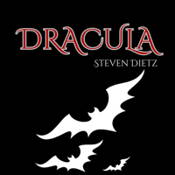
Bram Stoker鈥檚 1897 novel Dracula popularized the Gothic genre and brought vampire fiction to a mass audience, shaping popular understanding of the mythological creature. While playwright Steven Dietz takes some theatrical liberties, this adaptation is largely faithful to the source material and preserves the major plot and characters. Also intact are the style and tone of the original novel, complete with gore, special effects, and melodrama. The play is anchored with a prologue and epilogue delivered by Renfield, a mysterious, insane asylum patient under the spell of Count Dracula, a vampire who is equal parts debonair and violent. When the young Lucy begins to transform into a vampire, her best friend Mina summons the psychiatrist Dr. Seward to examine her. Flummoxed, Seward calls in his mentor, Professor Van Helsing. When Dracula鈥檚 lawyer and Mina鈥檚 fianc茅 Harker returns from Dracula鈥檚 castle in a state of shock, his journal paints a picture of the full extent of Dracula鈥檚 power. As the stakes get higher, the group must fight time to defeat evil. With an ensemble cast and minimal scenic requirements, Dietz鈥檚 adaptation offers a gripping horror play for theatres of any size or technical capability.
Dracula guide sections